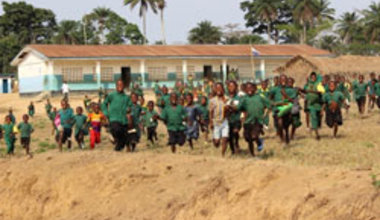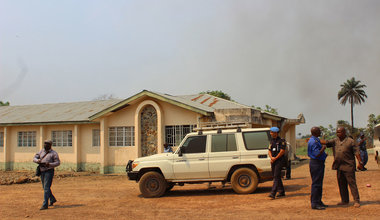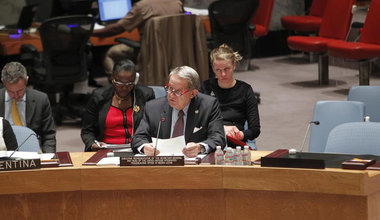The Human Rights Commission of Sierra Leone organised it's Third Annual Conference
18 April 2013 - The Human Rights Commission of Sierra Leone in collaboration with UNIPSIL Human Rights and with support from OHCHR organised its Third Annual Conference and Training workshop on Economic Social and Cultural Rights, Human rights monitoring and advocacy for the District Human Rights Committees (DHRCs).
The four-day program held in Makeni City commenced on 15th and ended on 18th April 2013 at the Richmond Tholley - SLTU Complex with forty-two participants; three from each DHRC representing the 13 District Human Rights Committees. This initiative was for UNIPSIL Human Rights Section to roll out its exit strategies which among others include: handing over the responsibility of managing District Human Rights Committees to the Human Rights commission of Sierra Leone.
The Human Rights Commission of Sierra Leone (HRCSL) in collaboration with UNIPSIL Human Rights and with support from OHCHR organised its Third Annual Conference and Training workshop on Economic Social and Cultural Rights, Human rights monitoring and advocacy for the District Human Rights Committees (DHRCs). The four-day program held in Makeni City commenced on 15th and ended on 18th April 2013 at the Richmond Tholley - SLTU Complex with forty-two participants; three from each DHRC representing the 13 District Human Rights Committees.
This initiative was for UNIPSIL Human Rights Section to roll out its exit strategies which among others include: handing over the responsibility of managing District Human Rights Committees to the Human Rights commission of Sierra Leone. The conference was followed by a three-day training workshop which identified the need for a shared vision between the HRCSL and DHRCs after UNIPSIL would have phased out; in furtherance to strengthening partnerships in the area of joint programming, capacity building and development, mobilisation and sharing of resources.
Beatriz Balbin - in her capacity as Chief of UNIPSIL HRS and OHCHR representative briefed participants on UNIPSIL’s transition and phase out plan. She informed participants that the mission will be drawing down with the eventual liquidation to come end of March 2014. She went on to give an overview on the draw down as it relates to the HR section: the Kenema office has already seized to function to be followed by the remaining field office of Bo, Makeni and Kono by end of September 2013. She requested for DHRCs to identify three key issues that UNIPSIL has been jointly supporting; the effect the UNIPSIL exit will have on these activities and to suggest recommendations that can help address the gap likely to be created. This was followed by a plenary session where participants came up challenges, gaps and recommendations -
Challenges - logistical support; joint human rights monitoring; capacity building in the administration of justice and conflict resolution among marginalised groups.
Gaps - area of coordination and collaboration between the DHRCs and the HRCSL; the need for government authorities to respect members of DHRCs at stakeholders’ meetings as well as the sustainability of the committees.
Recommendations – UNIPSIL HRS to do more capacity building activities particularly on Project Proposal Writing Skills; the Committees should be supported in building more partnerships and linkages with the UNCT especially UNDP, UNFPA and UNWOMEN and there should be joint programming, mobilisation and sharing of resources with the HRCSL; review the Commission’s Act to integrate DHRCs in the Commission’s Strategic Plan during this transition period.
 UN
UN




